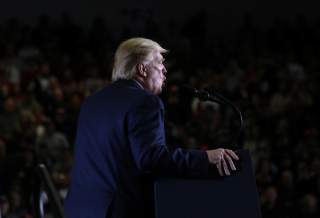The Trump Doctrine, Explained
Colin Dueck's Age of Iron: On Conservative Nationalism seeks to position Donald Trump's trade, immigration, security, and foriegn policies within the past century of Republican and conservative thinking.
Like his review of Trump’s European policy, Dueck’s outline of Trump’s policies with respect to other security issues, along with trade and related commercial issues, have in many cases been overtaken by events, some reflecting well on the president and others less so. The killing of ISIS leader Abu Bakr al-Baghdadi was certainly a triumphant moment for the president. On the other hand, ISIS has not been defeated, as he has frequently asserted, and it now has a new leader. Trump’s abandonment of the Syrian Kurds has enhanced Russia’s position in Syria. Moscow now operates not only from a recently leased air base in that country, but has established a new helicopter base in northern Syria. Trump’s withdrawal from the Iran nuclear accord has furnished Tehran with an excuse to expand its nuclear development program beyond the limits set out in that agreement. The killing of Quds Force leader Qassim Suleimani may ultimately yet prove to be problematic. Trump’s talks with North Korea’s Kim Jong-un have gone nowhere. His efforts to reach a trade agreement with China have only begun to bear some fruit. His withdrawal from the Trans-Pacific Partnership led both to a new trade agreement among many of the same nations and, for the first time, a modest agreement between most of those nations and China.
Dueck concludes that “the actual foreign policy choices, perspectives, and outcomes of the Trump Administration are in practice a hybrid or mixture of the nationalist with the conservative internationalist.” In practice, that may be the case, but not necessarily because of any particular orientation on Trump’s part. What Dueck calls “Trump’s recognized unpredictability” appears to be driven primarily, if not solely, by just two factors: to nourish his narcissism and to aggrandize his family’s fortunes—a reality that Dueck completely overlooks, or perhaps deliberately ignores. How else to explain the president’s outsized references to his own greatness; his frequent shout-outs to his golf courses and hotels; China’s granting of trademarks to his daughter Ivanka; or, most recently, after Dueck’s book went to press, the president’s ill-fated attempt to host the G20 summit at his money-losing Trump National Doral Miami hotel and country club?
HAVING DISCUSSED Trump’s policies, Dueck attempts to demonstrate why the president is more a symptom of conservative policy orientation rather than its cause. He cites polling that suggests that in general, Trump’s views regarding not only trade, but immigration, traditional alliances, and military interventions are not all that far removed from those of Americans of all political stripes, though they tend to be harsher and inchoate. Yet, he rightly points out that, in other respects, Trump’s policies do not fully reflect conservative views, which have not radically changed. Thus, Republican voters still tend to be internationalist. They are not-pro Putin. They are not uniformly opposed to free trade any more than Democrats are—and perhaps Democrats take an even harder line on this issue.
Dueck concludes with an outline of his own views as to what a conservative foreign policy should look like. In general, he adopts the conservative internationalist line favored by Eisenhower and Nixon. He is wary of military interventions, nation building, and supranational institutions such as the International Criminal Court and the Human Rights Council.
On the other hand, he rejects “offshore balancing” and disengagement from America’s commitments overseas. He sees Russia, like China, as a major challenge to American supremacy, while not discounting the threats posed by Iran, North Korea, and terrorism. He also emphasizes the importance of employing non-military tools, notably diplomacy, to further American objectives. In all of these respects, he cleaves to the Washington consensus on major security priorities, which H.R. McMaster and his nsc team outlined in their version of the national security strategy. It is a consensus that Trump not only has rejected, but actively ridicules.
Dueck certainly recognizes that public opinion continues to shift toward a more inward-looking American security policy. His book represents an effort to demonstrate that there is an ideological underpinning to Trump’s behavior that is based on that shift. Ultimately, however, Dueck fails to convince. Trump’s behavior has little to do with ideology. It has everything to do with Trump’s self-interest, and for that America continues to pay a very costly price.
Dov S. Zakheim was an Under Secretary of Defense (2001–2004) and a Deputy Under Secretary of Defense (1985–87). He is Vice Chairman of the Center for the National Interest.
Image: Reuters

